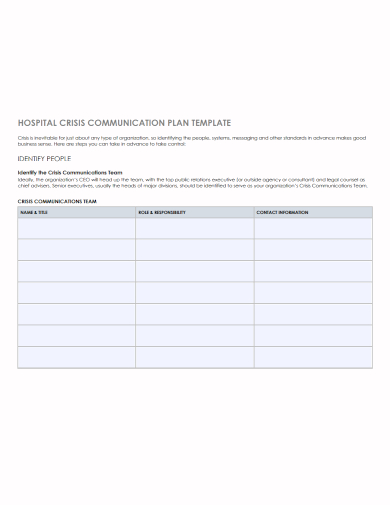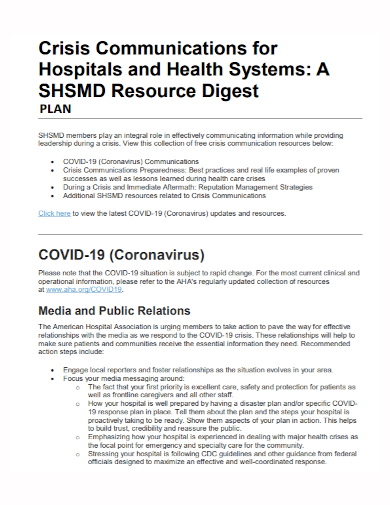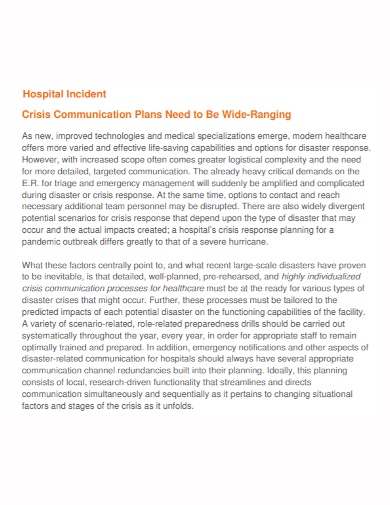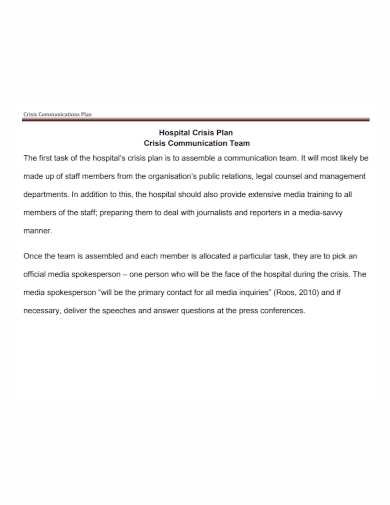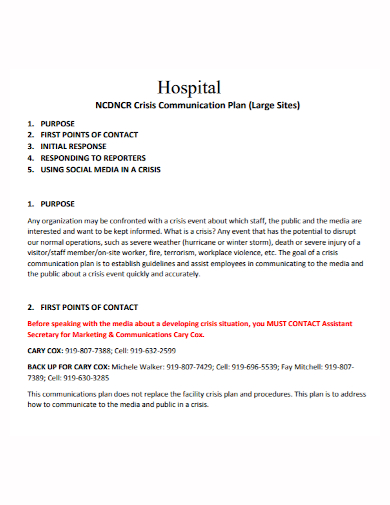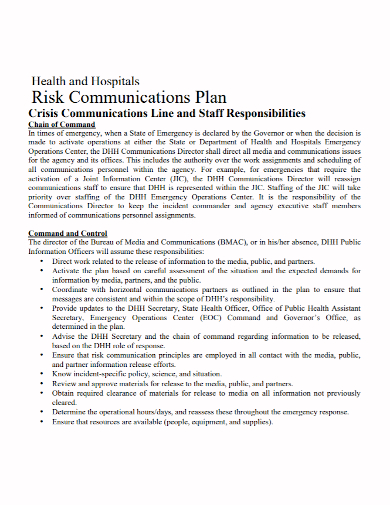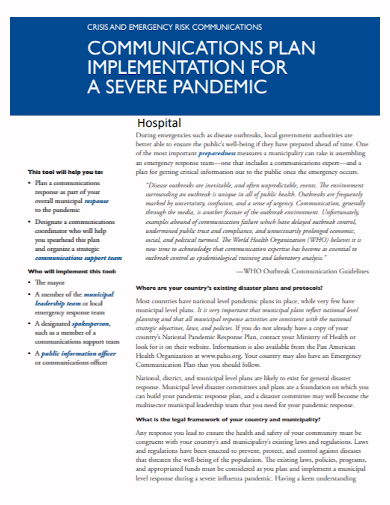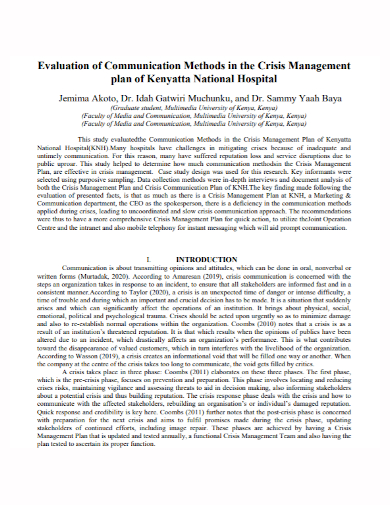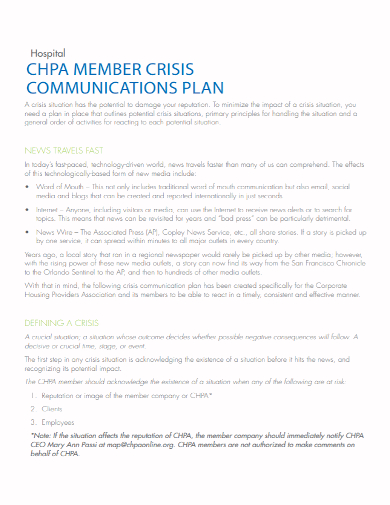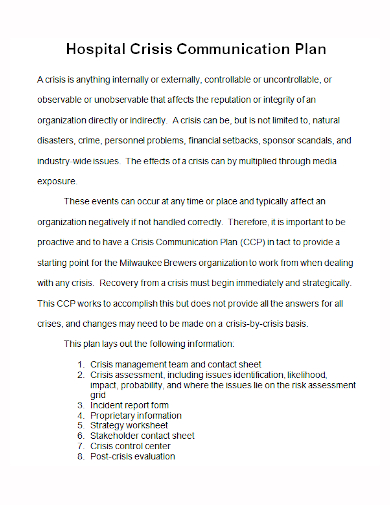Even hospitals are institutions that are vulnerable to emergencies, it can’t be helped since crisis can happen anytime or anywhere without warning. Like most businesses, hospitals are equipped with an emergency action plan which are written procedures that would help deal with all sort of emergencies. Part of planning for an emergency is a hospital crisis communication plan. In an event of an emergency, large institutions such as hospitals should have the need to factually communicate is immediate. If operations are disrupted, then there should be a back up plan as to how to disseminate the right information to other relevant parties. Read more about this in our article below and if you want to get started with planning check out our free hospital crisis communication plan samples below:
10+ Hospital Crisis Communication Plan Samples
1. Hospital Crisis Communication Plan Template
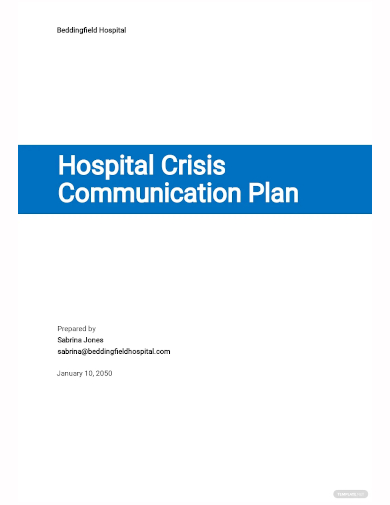
2. Hospital Crisis Communication Plan
3. Hospital Health Crisis Communication Plan
4. Hospital Incident Crisis Communication Plan
5. Hospital Team Crisis Communication Plan
6. Sample Hospital Crisis Communication Plan
7. Hospital Risk Crisis Communication Plan
8. Hospital Crisis Emergency Communication Plan
9. Hospital Management Crisis Communication Plan
10. Hospital Member Crisis Communication Plan
11. Standard Hospital Crisis Communication Plan
What Is a Hospital Crisis Communication Plan?
A well-designed communications strategy is a vital component whenever an incident would occur, most especially with large scale emergencies. Why the need of such? Its all about the trust, and more so when we talk about about hospitals were people go to when they are sick and seek medical help. Without a crisis communication plan, organizations such as hospitals that wait to respond, hesitate or lack visibility of action create uncertainty and anger – it diminishes marketplace trust. A hospital’s crisis communication plan must be able to effectively communicate so others do not fill the informational gap created by silence or misinformation. Any employee who is not authorized as a spokesperson should not make statements, comments or declarations internally, externally, to vendors, media, on social media, etc. All employees should direct inquiries to the designated primary and secondary spokespeople.
How To Develop a Hospital Crisis Communication Plan?
It is a necessity to include crisis communication plan when designing a emergency or crisis plan. With the rise of social media, and people who easily catch the wind of the news, a proper line of communication must be established with these outlets. It requires the proper attention and should not be disregarded by any organizations for that matter. Miscommunication could lead to distrust or to a more chaotic outcome. Every hospital staff and volunteers should be educated on what to say and what not to say during and after a crisis, whether to the press or on social media. To start, here are some key elements that would help you develop a hospital crisis communication plan.
I. Identify the Crisis Communications Team
You will need to identify several point persons who will be responsible and serve as potential spokespersons/subject matter experts who should make the ultimate decision about who will speak will be made once the crisis breaks. Consider all the different channels of communications, both internal and external, that you may need to cover. These individuals must be well informed and trained in advance. Create a complete database of internal and external stakeholders to guarantee that they obtain the exact messages you want them to hear and potentially repeat to other individuals or media outlets.
II. Communication Method
Hospitals must be able to establish a comprehensive method to contact staff, including patients’ physicians and other necessary and relevant persons. Plans should include a full list of stakeholders and staff should be notified of a crisis before the media, wherever possible. Well-coordinated communication within the facility, across healthcare providers, and with state and local public health departments and emergency management agencies.
III. Identifying The Risk
A hospital’s crisis management team must be able to identity in advance the various risk and threats that could possibly happen in a hospital. This is vital so organizations can identify and assess any damages that could be improve beforehand. But of course some emergencies cannot be predicted so pre-planning will help come up with possible responses, and best and worst case scenario.
IV. Creating a System of Communication
Setting up various system of communication for the stakeholders, staff and patients is important in order if one fails there would be a back-up for another. Example of which are emergency notification systems, monitoring system which is monitoring all stakeholder feedback during a crisis supports logical changes to strategy and tactics. And a crisis verification which would determine what has happened and immediately identify and document as many facts as possible.
V. Updating Technology
The advantages of technology that is gets more convenient to use and more reliable overtime. But it is important to update the line of communications in and out of the hospital premises. One of which is to be able track the location of on-duty staff and sheltered patients in the hospital’s care during an emergency. Hospitals need backup communication solutions to ensure the continuity of patient services.
VI. Regular Training and Updates
It is mandatory to regularly update training and testing methods, to ensure that all everyone is still on board and remembers what to do when an emergency would strike. Take note to align communication policies with current technologies, clinician and patient needs, and various disaster scenarios, including active shooter events.
VII. Post-Crisis Review
Once the crisis has passed, a best practice is to conduct a formal analysis of the situation. Review what worked, what failed, and what could be improved prior to the next event, and use the results to update the crisis communication plan.
FAQs
What Is an Emergency Response Plan?
These are a set of proper guidelines which are covered in a document that contains the necessary procedures to be implemented in case of an emergency.
Why Is Crisis Management Important?
Addressing a crisis in an efficient and decisive way helps protects organizations from the adverse effects of any crisis situation or event.
What Is a Public Relations Crisis?
A public relations crisis or PR crisis is when any negative event or review related to your business gains traction in the public sphere.
Hospitals are one of those institutions who are vulnerable during and after an emergency. Not only does the organization need to think about its hospital staff and property, but as well as for the well-being of its patients. With an effective hospital crisis communication plan, this can help the abate the damages cause by the crisis.
Related Posts
FREE 9+ 30-Day Marketing Plan Samples in PDF | MS Word | Apple Pages | Google Docs
FREE 3+ Sales Team Action Plan Samples in PDF | MS Word | Apple Pages | Google Docs
Marketing Plan For Small Business Samples
FREE 7+ Fashion Business Plan Samples in PDF
FREE 10+ Sprint Planning Samples In MS Word | Google Docs | PDF
FREE 10+ Wedding Planning Samples in MS Word | Apple Pages | Powerpoint | PDF
FREE 9+ Monthly Study Planner Samples in PSD | Illustrator | InDesign | PDF
FREE 9+ Sample Curriculum Planning Templates in PDF | MS Word
FREE 10+ Teacher Development Plan Samples in MS Word | Google Docs | Apple Pages | PDF
FREE 10+ Basketball Practice Plan Samples in PDF
FREE 12+ School Business Plan Samples in PDF | MS Word | Apple Pages | Google Docs
FREE 7+ Client Strategic Plan Samples in PDF | MS Word
FREE 11+ Trucking Business Plan Templates in PDF | MS Word | Google Docs | Pages
FREE 7+ Small Hotel Business Plan Samples PDF | MS Word | Apple Pages | Google Docs
FREE 14+ Bakery Business Plans in MS Word | PDF | Google Docs | Pages

